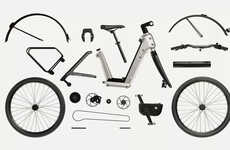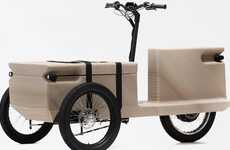
The Trayser E-Bike Can Be Maintained With 3D-Printed Replacement Parts
Rahul Kalvapalle — April 1, 2016 — Autos
References: ettindustries & theguardian
The Trayser is a high-tech e-bike, developed by New Zealand-based company ETT, that is just as noteworthy for its peculiar appearance as it is for its structural characteristics.
The most unique feature of this e-bike is the fact that it is the very first e-bike available that allows you to 3D-print replacement parts. All you have to do is visit the Shapeways website and order the 3D-printed replacement part. If you're confident about your own 3D-printing skills, you can even 3D-print parts yourself or build your own.
As far as performance specs are concerned, this e-bike is powered by a 42-volt lithium ion battery that gives it a range of up to 60 miles.
However, the ability to 3D-print replacement parts is what makes the Trayser truly stand out in the e-bike field, as it's a feature that could revolutionize the way people upgrade and alter e-bikes going forward.
The most unique feature of this e-bike is the fact that it is the very first e-bike available that allows you to 3D-print replacement parts. All you have to do is visit the Shapeways website and order the 3D-printed replacement part. If you're confident about your own 3D-printing skills, you can even 3D-print parts yourself or build your own.
As far as performance specs are concerned, this e-bike is powered by a 42-volt lithium ion battery that gives it a range of up to 60 miles.
However, the ability to 3D-print replacement parts is what makes the Trayser truly stand out in the e-bike field, as it's a feature that could revolutionize the way people upgrade and alter e-bikes going forward.
Trend Themes
1. 3d-printed Replacement Parts - The ability to 3D-print replacement parts for e-bikes presents a disruptive innovation opportunity for the cycling industry.
2. Customization and Upgradeability - The Trayser e-bike's ability to easily customize and upgrade with 3D-printed replacement parts opens up new possibilities in the personal transportation industry.
3. Sustainable Manufacturing - The use of 3D printing technology to manufacture replacement parts for e-bikes aligns with the growing trend towards sustainable manufacturing practices.
Industry Implications
1. Cycling - The cycling industry has the opportunity to embrace 3D printing technology to create customizable and easily repairable e-bikes.
2. Personal Transportation - The personal transportation industry can benefit from the ability to 3D-print replacement parts, providing customers with easy customization and upgrade options.
3. Manufacturing - The manufacturing industry can explore the use of 3D printing technology for sustainable production of replacement parts for various products, including e-bikes.
1.9
Score
Popularity
Activity
Freshness















